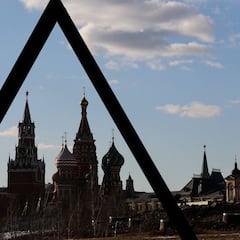How much is the Russian currency worth against the dollar? Has it dropped since the beginning of the invasion?
Sanctions imposed by the United States, the European Union, and countries around the world have decimated the Russian economy. What is the Ruble worth?


Since the invasion of Ukraine, the Russian ruble has decreased in value by thirty percent and now one ruble is worth less than a penny. Before the invasion the exchange rate had stood at around $0.11 for each ruble.
The Russian stock market has not opened since the invasion began, over fears that it could crash, putting the country's economy at greater threat of complete collapse. Tentatively, the market will reopen on Friday 18 March, but this date could be pushed back once again.
After the United States and European countries froze Russian currency assets, the Central Bank of Russia was unable to buy them back and the country was forced to increase their key interest rate to twenty percent. This was done in attempt to slow the movement of currency through the market but also led to a run on banks and ATMs, with many Russians worried that currency could become scarce.
Russia's central bank responded by banning the transfer and purchase of Euros and US dollars outside of Russia, while also prohibiting banks in the country to disburse these currencies to customers.
Inflation is skyrocketing
According to Moscow Today, an independent Russian newspaper, inflation has increased over four percnet in the four weeks. The Central Bank of Russia aims to keep inflation under four percent each year and prices are only expected to increase as the impact of sanctions begins to impact the economy more severely.
#Putin #inflation #Ruble pic.twitter.com/qm4ZaE904G
— George Papadopoulos (@feeonlyplanner) March 17, 2022
When speaking to the Moscow Times, Mario Bikarski an analyst with the Economist Intelligence Unit said that "households will be very severely hit and will pay a big price," adding that "It will be Russia’s private sector and households, especially lower-income households, that will take the biggest hits."
Will sanctions work?
Western countries have tried to dissuade Russian Vladimir Putin from continuing the invasion by deploying strong sanctions against him, Russian leaders, and oligarchs supportive of Putin's regime.
So far, this pressure has not led to a shift in military strategy.
What is weakening Russia's military is the response from Ukrainian fighters who have quickly gone from citizens to soldiers in just three short weeks. This strength has forced the Kremlin to rethink their strategy, giving Ukrainian allies more time to send weapons and humanitarian aid to the country. In the case that the country does fall, concerns over the flood of weapons into the Russian hands could as a grave geo-political threat.
While economic sanctions are one of the strongest non-militaristic tools available governments, they tend to be most effective when deployed against democratic regimes, which Russia is not. Additionally, the longer sanctions are imposed the less likely they are to lead to the desired outcome.
Take Cuba for example. The Caribbean island has been under US embargo for more than sixty-years with little political change enacted as a result. While Cuba has been able to survive the embargo, it has not always been easy and impacts on human health have been highlighted over the years.
When the Soviet Union collapsed, Cuba's economy was decimated, food and medicinal shortages were common and hunger sky rocketed. By 1994, around thirty-seven percent of families lacked adequate access to food. Through support from international organizations, this rate dropped to around five percent by 2001. The example of Cuba shows that it takes time but economies can adjust to sanctions, but that the highest paid is often by average people.
The theory of change that the sanctions will lead to the halt of the invasion of Ukraine is not based on the academic literature on sanctions. While all should be done to avoid a nuclear confrontation between Russia and the United States, leaders should speak tactfully about the all encompassing impact sanctions will have on the Russian people, many of whom to not support the war or Putin.
.@StateDeptSpox: "We have placed unprecedented pressure on the Russian economy. [...] Stock market remains closed, [...] the ruble is virtually worthless, Russia is on the verge of default, its credit rating is at junk status, hundreds of international companies are fleeing." pic.twitter.com/fiO4EcSQN8
— The Hill (@thehill) March 16, 2022
A lesson from history
Eugene Debs is often a forgotten character in American history. Born in the later half of the nineteenth century, Debs is known as the father of American socialism for his courage to stand up for the rights of workers and his belief that the a more just and egalitarian global order was possible.
To avoid widespread opposition to the war effort in the lead up to the US joining European allies in World War I, Congress passed the Sedition Act of 1918. While, the US Bill of Rights endows all citizens with rights to freedom of speech, association, and press, the 1918 bill severely limited those liberties. Congress justified a curtailing by saying that during times of war such a move could be made to protect the national security of the nation.
Debs was arrested after giving a speech questioning US involvement in World War I. His case was heard by the US Supreme Court which sentenced him to ten years in prison.
The message of this speech is powerful and includes an important lesson about the terrors and injustice of war that are critical to keep in mind as the conflict seems to escalating with each passing day.
Debs told those listening that political leaders and other elites have taught the public "to believe it to be your patriotic duty to go to war and to have yourselves slaughtered at their command." He told them that that the people, those "the working class, who make the supreme sacrifices, the working class who freely shed their blood and furnish the corpses, have never yet had a voice in either declaring war or making peace."
The illegal invasion of Ukraine by the Russian Federation should be sanctioned. Russian leaders, those who stand to gain from his war, should be held to account for the blood shed in the service of their own ends. However, because of the fragility of our economic system that leaves billions of people vulnerable to the will of a few extreamly powerful leaders --in the public and private sphere-- the people, particularly those in the working class, will pay a high price for the sanctions imposed.
We act as though this war was an inevitability and it was not. And while, the eyes of the world look to Eastern Europe and messages of solidarity are sent, it is important to remember that all human lives have value no matter if you are a child under bombardment in Mariupol or a child starving to death in Afghanistan.
Related stories
Before Eugene Debs was sentenced he addressed the court and his words can still bring light to a world living under a shadow of darkness. Knowing that he would be sentenced, Debs with great humility said the justices, "I can see the dawn of the better day for humanity. The people are awakening. In due time they will and must come to their own."
Through his speech he sent a message to those concerned by the direction the world was moving that "as the midnight approaches, the southern cross begins to bend, the whirling worlds change their places, and with starry finger-points the Almighty marks the passage of time upon the dial of the universe, and though no bell may beat the glad tidings, the lookout knows that the midnight is passing and that relief and rest are close at hand. Let the people everywhere take heart of hope, for the cross is bending, the midnight is passing, and joy cometh with the morning."

